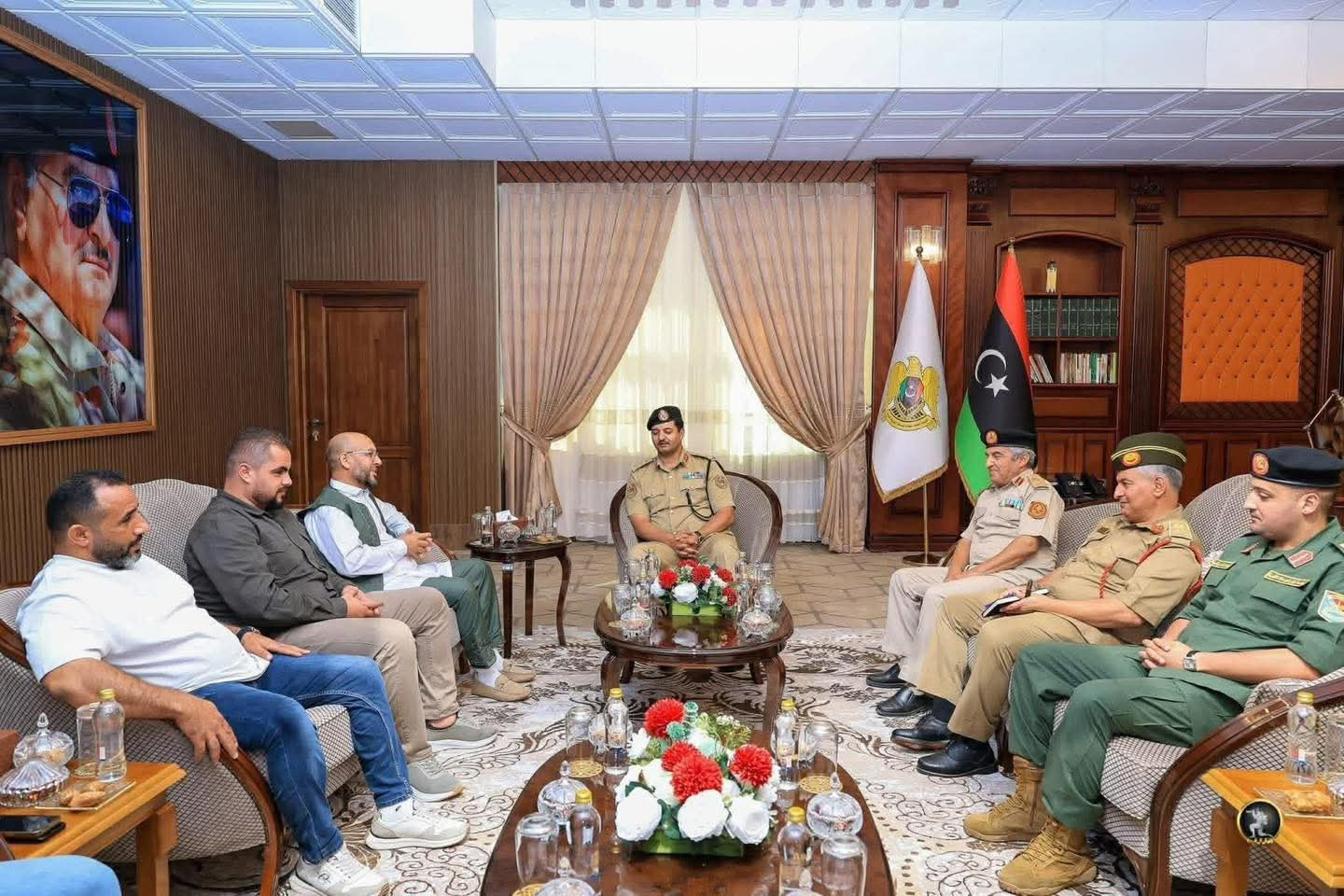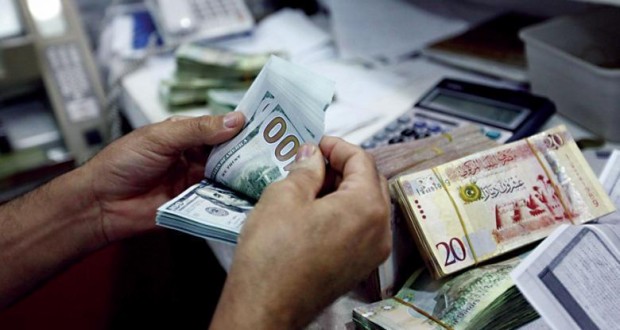Controversy over US$12.7 billion budget for Haftar-run fund
Published on 2025 June 20, Friday Back to articles
Aguila Saleh (L) and Belgasim Haftar (R)
The House of Representatives (House) provoked fury and upset this month when it arbitrarily and unilaterally approved a LD69 billion (US$12.7 billion) budget for the Development and Reconstruction Fund, which is headed by Khalifa Haftar’s son Belgasim Haftar.
Prime Minister Abdelhamid Dbeibah accused the parliament of creating a ‘financial catastrophe,’ and of using this budget as a cover to loot the public purse in the name of reconstruction. He also complained that the House’s passing a budget for a single agency showed its ‘blatant disregard’ for more than 20 official state institutions which still do not have any 2025 budget assigned to them.
While such a response was predictable, the passing of this special budget also caused upset inside the House itself. It held an initial session to discuss the matter on 2 June. Some MPs, including those from western Libya, were uncomfortable about such a large sum of money being effectively handed over to Haftar in this way. It was therefore agreed that a committee would be formed to review the funding proposals and that a decision would be made once it had reported its findings.
The following day, however, the parliament held another session that was attended by just 25 MPs and at which the Fund’s budget was approved. It was also agreed that the budget would be distributed equally over three years and that the House would be responsible for overseeing the Fund’s expenditure.
This infuriated those MPs who had expressed reservations about such a large sum being channelled to Haftar in this way. At least 113 MPs issued a statement calling on the House speaker, Aguila Saleh, to put a stop to the decision and to declare the session at which it was approved to be void.
They argued that the session had been illegal because it had not met the necessary official quorum and expressed their anger at the fact that no official invitations had been issued. They also complained that the legal and technical objections to the budget had not been resolved and called on the Central Bank of Libya (CB)L not to implement any measures in relation to the decision. These objections centred around the fact that there had been no details or information in the proposal about how the funds are to be spent or what projects it would finance. There was also no information about how the Fund would be run. They complained that the House’s Financial Affairs Committee had not been given the proposal to study and that the CBL had not even been consulted over the decision.
Saleh, however, ignored the request to annul the decision. Instead, he indicated his support by receiving Belgasim Haftar and GNS leader Osama Hammad at an 8 June meeting when he praised the Development and Construction Fund and what it had achieved.
From the way this decision was approved, it looks very likely that Belgasim Haftar and his father pressurised Saleh into pushing this budget through the House in order to get their hands on more money. Haftar has used the fund to press ahead with a large number of development projects in Benghazi and other eastern towns. This is a key means of winning support and making it appear as though eastern Libya is more effective and efficient than Dbeibah’s GNU. Its projects are diverse and include: the Benghazi International Stadium; Sirte Free Zone; and a new administrative complex in Derna. The fund is also another vehicle for corruption because, up until now, there has been no proper oversight or auditing by either the Audit Bureau, or the Administrative Control Authority (ACA).
Although Saleh has shown no sign of backing down the eastern authorities yielded a little to the widespread complaints that have come both from the east and west, as well as from outside Libya. On 16 June, Belgasim Haftar met the committee that was entrusted with preparing the budget and explained how it is to be dispensed. He said that it would be spent across three years and justly distributed across all areas of Libya.
Saleh also announced that Belgasim Haftar had requested that all exemptions from administrative and financial monitoring be lifted and that the Fund be subjected to proper auditing and oversight. The two men are aware of the optics of this move and do not want to be accused of lacking in transparency, and especially not by external powers. They want to at least give the impression that there will be some control and auditing of this development money.
However, by approving this budget, the House has placed the CBL governor, Naji Issa, in a difficult position. While it is the legitimate legislative body, the country’s economy is in crisis and can ill afford to spend scarce funds in this way. Public expenditure is getting out of control and is swallowing almost all the country’s revenues. In 2024 it exceeded revenues and the CBL bemoaned the unprecedented deterioration in the country’s financial balance sheet.
At the beginning of the year, Issa spoke of the need to rein in spending in order to create fiscal and economic stability. He also said that all spending on development projects should be put on hold until inflationary pressure has been controlled and the exchange rate is improved. It will be difficult for him to now justify supplying anything like this amount of money to channel a fund that is in the hands of one of Khalifa Haftar’s sons.
This excerpt is taken from Libya Focus, our monthly intelligence report on Libya. Click here to receive a free sample copy.The June 2025 issue of Libya Focus also includes the following:
Politics
- Tripoli remains tense as Presidency Council tries to impose order…
- Implications
- Anti-Dbeibah protests persist…
- UNSMIL’s Advisory Committee submits its proposals…
Security
- Fresh clashes in Sabratha…
- Al-Marsa Battalion threatens ’harsh response’ if attacked
- Armed group breaks into the NOC’s headquarters
- Sudan accuses LAAF of supporting the RSF…
Energy & Economy
- Controversy over Development and Reconstruction Fund budget…



